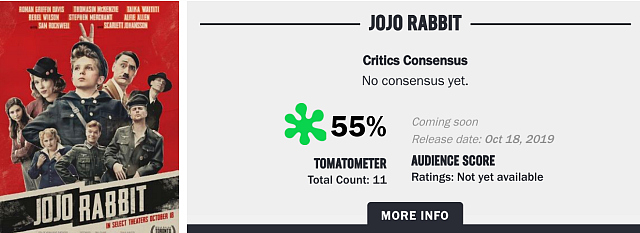The press and marketing hype that has been inflating expectations for Taika Waititi‘s Jojo Rabbit (Fox Searchlight/Disney, 10.18) collapsed in a heap after last night’s Toronto Film Festival screening. Early reviews suggest that the broad “anti-hate satire” may find favor among younger audiences and perhaps the New Academy Kidz, but the over-40 contingent will be frowning and tut-tutting for the most part.
Right now Jojo has a 55% rating at Rotten Tomatoes and 49% score with Metacritic. Do those numbers indicate an Academy contender or perhaps a box-office go-getter? I don’t want to be the one to say it.

“Jojo is a totally irresponsible movie. The amount of anti-Semitic and Holocaust jokes played for laughs is disturbing.” — World of Reel’s Jordan Ruimy.
“This spectacularly wrongheaded ‘anti-hate satire‘ (as per the how-the-hell-do-we-market-this-thing? ad campaign) is the feature-length equivalent of the ‘Springtime for Hitler’ number from Mel Brooks’ The Producers, sans context and self-awareness. It takes place in a goofball period la-la land of its own creation, with sets as minutely detailed and shots as precisely composed as those in a Wes Anderson fantasia. Indeed, Jojo Rabbit suggests what that dapper hipster auteur might generate if he was to remake Elem Klimov’s hallucinatory, horrifying World War II epic Come and See, and that’s not a compliment.” — Slant‘s Keith Uhlich.
“Taking straight from the Chaplin playbook, Waititi’s Hitler is a Mr. Bean-esque figure, hammed up to eleven as the invisible friend of young Jojo Betzler (Roman Griffin Davis). He leaps around, talks in a thick approximation of a German accent and encourages young Jojo to be the best little Nazi in the whole of the Third Reich. He is, undoubtedly, the worst thing about the film — distracting and one-note. It is possible to parody Hitler successfully, but in leaning too heavily on basic mockery, there’s nothing new that this performance brings to the table.” — Little White Lies‘ Hannah Woodhead.
“[Waititi’s decision to play a fantasy Adolf Hitler buddy figure] often feels like a way of distracting us from the truth, an elaborate smoke and mirrors act to fool us into believing Jojo Rabbit has something new to offer. Because while there are some initially amusing moments given the outlandish conceit, Waititi doesn’t really know what to do with his imaginary Hitler past an increasingly repetitive cycle of decreasingly funny acts of idiocy. He’s essentially a single sketch character and while Waititi plays him well, there’s only so much we need of him.” — The Guardian‘s Benjamin Lee.
“Just as it was easy to like 1999 multiple Oscar winner Life Is Beautiful, it was even easier to dislike it, and the same holds true for Jojo Rabbit, a rollicking comedy about a young German boy during World War II who has his very own special edition of Adolf Hitler as his closest playtime companion. The brash way in which the film plays extreme Nazi views for laughs and then twists them for emotional dividends will once again divide the public, and it’s quite likely that younger viewers won’t be bothered by the film’s fast and loose attitude.” — Hollywood Reporter critic Todd McCarthy.
“The ultimate intent of the comedy in Jojo Rabbit isn’t to make us laugh. It’s to get the audience to flatter itself for liking a movie that pretends to be audacious when it’s actually quite tidy and safe. The comedy is the hook, the bait, the amuse-bouche, the cue for us to detach ourselves from whatever we’re watching and feel good about it (as opposed to merely disengaged). It’s part of the Jojo Rabbit package — a movie that’s trying to hip itself into the center of the awards season (and just might). It’s this year’s model of Nazi Oscar-bait showmanship: Life Is Beautiful” made with attitude.” — Variety‘s Owen Gleiberman.

